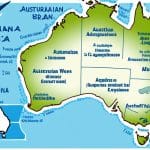Did you know that Australia is the third most popular destination for international students, attracting over 700,000 students from around the world every year? The country’s education system has gained a well-deserved reputation for offering high-quality education and excellent learning opportunities.
Whether you are considering primary or secondary education, vocational training, or higher education, Australia provides a range of options to suit your interests and aspirations. With renowned universities, comprehensive student support services, and a diverse cultural experience, it’s no wonder that international students are flocking to Australia for their educational journey.
Key Takeaways:
- Australia is the third most popular destination for international students.
- The country’s education system offers high-quality education and excellent learning opportunities.
- Australia provides a range of education options, including primary and secondary education, vocational training, and higher education.
- The country is known for its renowned universities and comprehensive student support services.
- Studying in Australia offers a diverse cultural experience.
Overview of the Australian Education System
When it comes to education, Australia has established itself as a global leader, offering a comprehensive and well-organized system that caters to students of all levels. From primary to tertiary education, the Australian Education System is renowned for its quality and diversity.
The Australian Education System adheres to a three-tier structure, which includes primary, secondary, and tertiary levels. Each level plays a crucial role in shaping students’ knowledge, skills, and future prospects.
Primary Education
The foundation of a student’s educational journey in Australia begins with primary education. At this level, students receive a well-rounded education that focuses on core subjects such as English, mathematics, science, and humanities. The primary education stage typically lasts for six years, starting from Year 1 and progressing to Year 6. Primary schools in Australia create a nurturing and inclusive environment that fosters critical thinking, creativity, and social development.
Secondary Education
Building upon the knowledge gained in primary school, secondary education in Australia provides students with a more specialized curriculum. Students can choose from a range of subjects based on their interests and career aspirations. Secondary schools in Australia offer both academic and vocational pathways, allowing students to pursue different learning streams. This stage usually lasts for six years, starting from Year 7 and progressing through to Year 12. Upon completion, students are awarded the prestigious Senior Secondary Certificate of Education (SSCE), which opens doors to various educational and career opportunities.
Tertiary Education
At the tertiary level, Australia offers a wide range of institutions that cater to higher education. This includes universities, colleges, and vocational training providers. Australian universities are well-regarded globally for their high academic standards and research-driven approach. Whether students choose to pursue a bachelor’s degree, postgraduate studies, or vocational training, the tertiary education system in Australia equips them with the necessary knowledge, skills, and qualifications for professional success.
Primary Education in Australia
Primary education plays a crucial role in the Australian education system, laying the foundation for students’ future academic and personal development. Australian primary schools provide a nurturing environment where children aged five to twelve receive a comprehensive education.
The primary education curriculum in Australia focuses on essential subjects such as English, mathematics, science, humanities, and social sciences. Additionally, students engage in physical education, arts, and languages to foster a well-rounded education. The curriculum is designed to promote critical thinking, creativity, and problem-solving skills.
Primary education in Australia typically spans six years, from Year 1 to Year 6. Each school year is divided into four terms, with approximately 10 to 12 weeks per term. Students progress through the primary grades, building a solid educational foundation and acquiring essential knowledge and skills along the way.
| Key Features of Primary Schools in Australia | Curriculum | Duration |
|---|---|---|
| 1. Inclusive Learning Environment | 1. Comprehensive curriculum with focus on core subjects | 1. Spanning six years from Year 1 to Year 6 |
| 2. Experienced and Qualified Teachers | 2. Emphasis on developing critical thinking and problem-solving skills | 2. Approximately 10 to 12 weeks per term |
| 3. Student-Centered Approach | 3. Integration of physical education, arts, and languages | 3. Building a solid educational foundation |
“Primary education in Australia provides a supportive and inclusive learning environment, fostering the holistic development of every child. With a comprehensive curriculum and experienced teachers, primary schools equip students with the necessary knowledge and skills for future success.”
In addition to academic learning, primary schools in Australia emphasize holistic development by fostering social skills, emotional intelligence, and cultural awareness. Students are encouraged to participate in extracurricular activities, including sports, music, and clubs, to enhance their interests and talents.
The primary education stage in Australia sets the groundwork for students to transition smoothly into secondary education, equipping them with a solid academic foundation and a love for learning.
Secondary Education in Australia
Secondary education in Australia is an essential stage in the education system, providing students with a comprehensive and well-rounded academic foundation. The secondary education stage typically encompasses Years 7 to 12, catering to students aged between 12 and 18. It plays a significant role in shaping students’ knowledge, skills, and future career prospects.
In Australia, secondary education is offered in various types of schools, including government schools, independent schools, and Catholic schools. These schools provide students with a range of learning environments and educational approaches, allowing them to choose an institution that aligns with their individual needs and preferences.
Throughout secondary education, students study a broad range of subjects that contribute to their overall learning experience and personal development. Common subjects include Mathematics, English, Science, History, and Languages. Schools also offer elective subjects that enable students to explore their interests and pursue specialized areas of study.
Assessment plays a crucial role in secondary education, providing a measure of students’ knowledge and progress. Assessment methods may vary across schools and subjects, including written examinations, assignments, practical demonstrations, and oral presentations. These assessments aim to evaluate students’ understanding, critical thinking skills, and ability to apply knowledge in real-world scenarios.
Furthermore, secondary education in Australia not only focuses on academic excellence but also emphasizes the development of essential life skills and values. Schools often offer a wide range of co-curricular activities, including sports, arts, music, and community service programs. These activities foster students’ social, emotional, and physical growth, promoting a holistic approach to education.
“Secondary education in Australia equips students with the knowledge, skills, and resilience needed to adapt to an ever-changing world. It instills a passion for lifelong learning and prepares students for higher education or entry into the workforce.”
A significant milestone for students in the final years of secondary education is the completion of the Year 12 qualification, which is commonly known as the Certificate of Education. This qualification is recognized nationwide and enables students to pursue further education at universities, vocational education institutions, or embark on their chosen career paths.
Overall, secondary education in Australia provides a solid foundation for students, equipping them with the necessary skills, knowledge, and values to thrive in an increasingly competitive and dynamic world.
Types of Schools in Australia
| Type of School | Description |
|---|---|
| Government Schools | These schools are publicly funded by the government and provide education to students from diverse backgrounds. They follow the national curriculum and offer a comprehensive range of academic and extracurricular programs. |
| Independent Schools | Also known as private schools, independent schools operate independently of government funding. They often have their own unique curriculum, educational philosophy, and may offer specialized programs or facilities. |
| Catholic Schools | Managed by the Catholic Education Office, Catholic schools offer education based on Catholic teachings. They provide a values-based education and often have a strong focus on religious studies and community involvement. |
The image above provides an overview of the secondary education stage in Australia.
Vocational Education and Training (VET) in Australia
The Vocational Education and Training (VET) sector in Australia plays a vital role in equipping individuals with practical skills and industry-specific training. VET courses are designed to meet the needs of various industries, providing learners with the knowledge and expertise required for successful careers in their chosen fields.
One of the key advantages of VET courses is their focus on hands-on learning. Students have the opportunity to gain practical experience and develop relevant skills through workshops, simulations, and industry placements. This practical approach enables learners to apply their knowledge in real-world settings, preparing them for the demands of the workforce.
VET courses cover a wide range of industries and occupations, including construction, hospitality, healthcare, information technology, and trades. Students can choose from a diverse array of qualifications, ranging from certificates and diplomas to advanced diplomas. This flexibility allows individuals to tailor their training to their specific career goals, enhancing their employment prospects.
Furthermore, VET courses often incorporate practical assessments and workplace projects, ensuring that learners are well-prepared to meet industry standards and expectations. This hands-on approach not only enhances technical skills but also fosters essential employability skills such as teamwork, communication, problem-solving, and critical thinking.
The Australian government recognizes the importance of the VET sector and actively supports it through funding initiatives and quality assurance measures. As a result, VET qualifications are highly regarded both domestically and internationally, making them a valuable asset for career advancement and global mobility.
Whether individuals are seeking a career change, skills enhancement, or a pathway to further studies, Vocational Education and Training in Australia offers a comprehensive and practical learning experience that equips learners with the skills needed for success in their chosen industries.
Benefits of VET Courses in Australia:
- Industry-focused training and practical skills development
- Wide range of qualifications and career pathways
- Opportunities for hands-on learning through workshops and industry placements
- Emphasis on employability skills development
- Recognition and value both domestically and internationally
| VET Course | Duration | Qualification |
|---|---|---|
| Certificate III in Hospitality | 6 months | Certificate III |
| Diploma of Business | 1 year | Diploma |
| Certificate IV in Information Technology | 9 months | Certificate IV |
| Advanced Diploma of Engineering | 2 years | Advanced Diploma |
Whether aspiring chefs, skilled tradespersons, or future business leaders, VET courses in Australia provide learners with the practical skills and industry-specific training they need to excel in their chosen professions.
Higher Education in Australia
When it comes to higher education, Australia offers a wide range of options for students seeking quality academic programs and a globally recognized degree. Australian universities have a strong reputation for their academic excellence, research output, and state-of-the-art facilities. In addition to universities, there are also colleges and specialized institutions that provide focused vocational training and professional qualifications.
Australia is home to several world-ranking universities that attract students from all over the world. These institutions offer a diverse range of courses across various disciplines, ensuring that students can find a program that aligns with their interests and career goals. With a focus on practical learning and industry connections, Australian universities prepare students for the demands of the professional world.
The table below showcases the top universities in Australia:
| University | World Ranking |
|---|---|
| The University of Melbourne | 32 |
| The University of Sydney | 37 |
| The University of Queensland | 47 |
| Monash University | 58 |
| The University of New South Wales | 67 |
| The University of Western Australia | 86 |
Image:
Australian universities are known for their research contributions and collaborations with industries, providing ample opportunities for students to engage in cutting-edge research and gain practical experience. Many universities also prioritize a global outlook, fostering multicultural environments and offering exchange programs with partner institutions around the world.
In addition to academic excellence, Australian higher education institutions provide a supportive and inclusive learning environment. Student support services, such as counseling, career guidance, and academic resources, are readily available to help students succeed in their studies.
Whether you are interested in pursuing a bachelor’s degree, master’s degree, or PhD, the higher education institutions in Australia offer a range of programs to suit your needs. Consider exploring the websites of the universities listed above to discover specific courses, admission requirements, and scholarship opportunities.
University Rankings in Australia
When it comes to pursuing higher education, choosing the right university is crucial to one’s academic and professional journey. Australia is renowned for its strong academic landscape and world-class institutions. To assist prospective students in making informed choices, university rankings play a significant role in evaluating the reputation and quality of Australian universities.
The rankings highlight the academic excellence, research output, student satisfaction, and overall performance of universities in Australia. These rankings are based on various factors such as faculty expertise, research capabilities, student-to-faculty ratio, industry collaborations, and global partnerships.
Global Recognition and Academic Standing
Australian universities consistently feature prominently in global university rankings, solidifying their position as academic powerhouses. Institutions such as the University of Melbourne, Australian National University, and the University of Sydney consistently rank among the top 100 universities worldwide.
These rankings not only serve as a testament to the quality of education provided by Australian universities but also increase the international recognition of degrees earned by graduates. Employers worldwide often value degrees from renowned institutions, providing graduates with a competitive edge in the job market.
Comparative Analysis of Australian Universities
| Ranking | University | Location |
|---|---|---|
| 1 | University of Melbourne | Melbourne |
| 2 | Australian National University | Canberra |
| 3 | University of Sydney | Sydney |
| 4 | University of Queensland | Brisbane |
| 5 | Monash University | Melbourne |
The table above showcases a sample comparative analysis of the top-ranked universities in Australia. While these rankings provide valuable insights, it’s important to note that each university offers unique strengths and specializations. Prospective students should consider their individual interests, desired field of study, and career goals when selecting a university.
Furthermore, rankings should not be the sole determinant in choosing a university. It is essential to thoroughly research and consider factors such as campus facilities, student support services, course offerings, and industry connections.
University rankings offer guidance for students, highlighting the prestige and quality of Australian institutions. However, it is crucial for students to strike a balance between rankings and personal preferences to ensure a well-rounded and fulfilling educational experience.
Benefits of Studying in Australia
Studying in Australia offers numerous benefits for international students, making it an attractive destination for those seeking quality education and diverse opportunities. Whether it’s experiencing a vibrant multicultural environment, exploring stunning landscapes, or gaining valuable skills for a successful career, Australia provides a rich and rewarding academic experience.
Cultural Exposure
One of the standout advantages of studying in Australia is the opportunity to immerse yourself in a vibrant and multicultural society. With people from all over the world, Australian campuses offer a diverse and inclusive environment that promotes cross-cultural understanding and international friendships. This exposure to different perspectives and cultures not only enhances your educational journey but also broadens your horizons and enriches your personal growth.
Diverse Opportunities
Australia is renowned for its world-class education system, offering an extensive range of study options across various disciplines. From leading universities to vocational training institutions, international students can choose from a diverse array of courses tailored to their interests and career aspirations. Whether you’re passionate about business, engineering, arts, or healthcare, Australia provides quality education and specialized programs to meet your academic goals.
The country’s strong links with industry and emphasis on practical learning ensure that students gain relevant and hands-on experience. This prepares them for the dynamic global job market, equipping them with the knowledge and skills needed to excel in their chosen fields.
Attractive Post-Study Work Options
Australia offers attractive post-study work options for international graduates, allowing them to further their career prospects while gaining valuable work experience. The Temporary Graduate Visa allows eligible graduates to work in Australia after completing their studies, providing an opportunity to apply their newly acquired skills to real-world professional settings.
Furthermore, graduates who meet specific criteria may access pathways to permanent residency in Australia. This offers long-term career prospects and the chance to build a successful future in one of the world’s most liveable countries.
Overall, studying in Australia opens doors to a world of opportunities, combining high-quality education, cultural diversity, and a supportive environment. With its global reputation for academic excellence and attractive post-study work options, it is no wonder that Australia remains a top choice for international students.
International Student Support in Australia
International students pursuing education in Australia can benefit from a range of support services and resources. These services are designed to assist students in various aspects of their academic journey and to ensure a smooth transition to life in a new country. From academic guidance to accommodation assistance, international students can find comprehensive support tailored to their needs.
Academic Guidance
Recognizing the unique challenges faced by international students, Australian educational institutions provide academic guidance to ensure their success. Dedicated advisors are available to assist students with course selection, study skills development, and academic planning. They offer guidance on academic expectations, assessment requirements, and access to additional learning resources.
Accommodation Assistance
Finding suitable accommodation is crucial for international students. Australian universities often provide assistance in securing on-campus accommodation or help students connect with off-campus housing options. This ensures students have access to safe and affordable living arrangements, helping them settle into their new environment comfortably.
Health and Well-being Support
The well-being and health of international students are prioritized in Australia. Institutions provide access to counseling services, both on-campus and online, to support students’ mental health. Additionally, international students are required to have health insurance to cover any medical needs during their stay in Australia.
| Support Services | Description |
|---|---|
| Career Guidance | Assistance in building career pathways, job search strategies, resume writing, and interview preparation. |
| Language Support | English language support programs and resources to help international students enhance their language skills. |
| Orientation Programs | Orientation sessions and workshops to introduce international students to the campus, facilities, and Australian culture. |
| Student Clubs and Societies | A wide range of student-run clubs and societies that provide opportunities for socializing and networking. |
With comprehensive support services in place, international students in Australia can feel confident and empowered to achieve their academic goals while also enjoying a safe and enriching experience in a vibrant multicultural society.
Scholarships and Financial Aid for International Students
International students pursuing education in Australia can access various scholarships and financial aid options to support their academic journey. These opportunities are specifically designed to assist students with the costs of tuition, living expenses, and other related expenses. Scholarships and financial aid provide invaluable support, enabling international students to fully immerse themselves in their studies and make the most of their time in Australia.
There are numerous scholarships available for international students, offered by educational institutions, government bodies, and private organizations. These scholarships aim to attract top talent and promote diversity in Australian classrooms by providing financial assistance to deserving students.
Australian Government Scholarships
- Australia Awards Scholarships: Fully funded scholarships provided by the Australian Government to students from developing countries.
- Destination Australia: Scholarships that support both domestic and international students in undertaking studies at regional Australian universities and institutions.
Institutional Scholarships
- University-specific scholarships: Many Australian universities offer scholarships for international students based on academic merit, leadership qualities, and extracurricular achievements.
- Faculty/Department-specific scholarships: Some scholarships are available for students pursuing specific fields of study, such as science, engineering, business, or arts.
External Scholarships and Grants
- Organizations and foundations: Various organizations and foundations provide scholarships and grants to international students based on criteria such as nationality, area of study, or personal circumstances.
Financial aid options in Australia include loans, grants, and work-study programs. International students may be eligible for government loans or grants that can help cover their educational expenses. Additionally, work-study programs allow students to gain valuable work experience while studying, helping them offset their expenses.
It’s important to note that each scholarship and financial aid program has its own specific requirements and application processes. Students should thoroughly research and carefully follow the guidelines provided by each scholarship provider to maximize their chances of success.
For more information on scholarships and financial aid opportunities for international students in Australia, it is recommended to visit the official websites of educational institutions, government departments, and relevant scholarship providers.
Study Abroad Programs and Exchange Opportunities
For global learners seeking to broaden their educational horizons, studying abroad can be a transformative experience. Australian institutions offer a wide range of study abroad programs and student exchange opportunities that provide international students with the chance to immerse themselves in the Australian education system.
Study abroad programs allow students to spend a designated period of time studying at an Australian university or college. These programs typically range from a few weeks to a full academic year. Students have the opportunity to choose from a variety of courses and disciplines, allowing them to tailor their education to their specific interests and career goals.
On the other hand, student exchange programs enable students to trade places with their counterparts at an Australian educational institution. This exchange of students promotes cultural exchange and fosters a deeper understanding and appreciation of different educational systems.
During their study abroad or exchange experience, students have the opportunity to fully immerse themselves in the Australian university culture, interact with local students, and participate in a variety of extracurricular activities. This not only enhances their academic learning but also allows them to develop lifelong friendships and networks with students from around the world.
Participating in study abroad programs and student exchange opportunities not only enriches students’ educational experiences but also enhances their employability. Employers value international experiences, as they demonstrate adaptability, cultural awareness, and global perspectives.
If you’re considering studying abroad, Australia offers a wide range of study abroad programs and student exchange opportunities that can open doors to new academic and personal experiences. It’s an opportunity to explore a vibrant and diverse country while receiving a quality education.
English Language Proficiency Requirements
International students seeking admission to educational institutions in Australia are required to demonstrate proficiency in the English language. This ensures that students can fully participate in their chosen courses and effectively communicate in academic and social settings.
Language tests are commonly used to assess the English language skills of prospective students. The most widely accepted tests include the International English Language Testing System (IELTS), Test of English as a Foreign Language (TOEFL), and Pearson Test of English (PTE) Academic. These tests evaluate key language skills such as reading, writing, listening, and speaking.
Each educational institution in Australia sets its own English language requirements, specifying the minimum test scores students need to achieve for admission. These scores may vary depending on the level and type of course, so it is important for students to review the specific requirements of their chosen institutions.
For example, a university might require an overall IELTS score of 6.5, with a minimum of 6.0 in each individual component, while a vocational training institution may have lower score requirements. It is essential for students to aim for the required scores to ensure their eligibility for admission.
A strong command of the English language is crucial for success in Australian educational institutions. It enables students to actively engage in classroom discussions, comprehend course materials, complete assignments, and communicate effectively with peers and instructors.
Work Opportunities for International Students
International students studying in Australia have the opportunity to gain valuable work experience during their studies and explore post-study work options. The Australian government recognizes the importance of work permissions and post-study work opportunities in attracting international talent and fostering a skilled workforce.
Part-time Work During Studies
While pursuing their education, international students are allowed to work part-time to support their living expenses and gain practical experience. As per work permissions, they can work up to 40 hours per fortnight during their study period. This allows them to earn an income, develop essential skills, and immerse themselves in the local work culture.
Post-Study Work Rights
Australia offers generous post-study work rights to international students, giving them the opportunity to apply their newly acquired knowledge and skills in the Australian job market. These post-study work options enable students to gain relevant work experience and contribute to the country’s workforce.
“Studying in Australia not only provides a high-quality education but also opens doors to a range of work opportunities. The post-study work rights allowed me to gain hands-on experience in my field and establish professional connections for future career prospects.” – Emma, International Student from Canada
Post-study work rights vary depending on the level of qualification obtained. Bachelor’s and master’s degree graduates can apply for a two-year post-study work visa, while doctoral degree holders can extend their stay for up to four years. These work rights provide international students with a valuable pathway to gain industry experience, enhance their employability, and potentially qualify for permanent residency in Australia.
Resources for Job Seeking
International students in Australia can access various resources and services to support their job search. Universities and educational institutions offer career counseling, job fairs, and internship programs to connect students with potential employers. Additionally, online job portals and networking events provide avenues for students to explore job opportunities and build professional networks in their chosen fields.
Cultural Experience and Lifestyle in Australia
Living and studying in Australia provides international students with a unique opportunity to immerse themselves in the rich and diverse Australian culture. From vibrant cities to breathtaking natural landscapes, Australia offers a captivating lifestyle that appeals to students from around the world.
One of the highlights of Australian culture is its multiculturalism. With a population composed of people from various backgrounds, international students have the chance to interact with individuals from different countries, ethnicities, and cultures. This exposure to diversity fosters global understanding, tolerance, and appreciation of different perspectives.
Australian cities are known for their lively and inclusive atmosphere. Melbourne, Sydney, Brisbane, and Perth, among other cities, boast a thriving arts scene, vibrant festivals, and a wide range of entertainment options. Whether it’s exploring museums and art galleries, enjoying live music performances, or indulging in local cuisine, students can experience the vibrant and dynamic cultural scene in Australia.
“Studying in Australia not only gave me an excellent education but also allowed me to experience a diverse and vibrant culture. I had the opportunity to attend festivals, explore art galleries, and taste a variety of delicious cuisines, all while making lifelong friendships with people from different backgrounds.”
Australia’s natural beauty is another aspect that sets it apart. From the stunning beaches and breathtaking coastlines to the awe-inspiring Outback and lush rainforests, the country offers a plethora of outdoor activities for students to enjoy. Whether it’s surfing, hiking, wildlife spotting, or simply taking in the scenic landscapes, students can explore the unique and diverse natural wonders that Australia has to offer.
Additionally, Australian lifestyle values a healthy work-life balance. Students can expect a laid-back and friendly environment, where they can pursue their educational goals while also having time to socialize and engage in extracurricular activities. Australia’s emphasis on leisure, outdoor activities, and wellbeing allows students to lead a balanced lifestyle while experiencing personal growth.
Testimonials from International Students
Read and be inspired by the testimonials of international students who have had the opportunity to study in Australia. Their experiences provide valuable insights and perspectives on the education system and student life in the country.
-
“Studying in Australia has been an incredible journey. The quality of education I received exceeded my expectations, and I was able to connect with students from all over the world. The academic support and resources available to international students truly enhanced my learning experience.”
– Maria Fernandez from Spain -
“Choosing to pursue my higher education in Australia was one of the best decisions I’ve made. The universities here offer a wide range of courses, and the professors are highly knowledgeable and supportive. I had the opportunity to participate in cutting-edge research projects, which have greatly enriched my academic and professional growth.”
– Li Wei from China -
“Australia provided me with a vibrant and inclusive learning environment. The multicultural atmosphere on campus allowed me to develop strong cross-cultural communication skills and make lifelong friendships with students from different backgrounds. The support services for international students were excellent, ensuring that I had a smooth transition into university life.”
– Emily Johnson from the United States
These testimonials highlight the positive experiences that international students have had while studying in Australia. As you can see, the education system not only offers high-quality academic programs but also fosters cultural diversity and personal growth.
| Benefits of Studying in Australia | Testimonials from International Students |
|---|---|
| Affordable Tuition Fees |
|
| World-Class Universities |
|
| Post-Study Work Opportunities |
|
Conclusion
After exploring the education system in Australia, it is evident that the country offers a high-quality learning experience for global learners. The Australian education system is well-structured and organized, providing students with a seamless educational journey from primary to tertiary levels.
At the primary education level, students receive a comprehensive curriculum and benefit from the nurturing environment of primary schools. Moving on to secondary education, students have access to a variety of schools and subjects, preparing them for future academic and career paths.
Australia’s vocational education and training (VET) sector focuses on practical skills and industry-specific training, offering valuable opportunities for skills development. Furthermore, the higher education options, including universities and specialized institutions, provide students with a diverse range of academic programs and research opportunities.
Studying in Australia also brings numerous benefits to international students, including cultural exposure, diverse opportunities, and attractive post-study work options. The country’s strong academic standing globally, supported by top-ranked universities, further enhances the educational experience.
With comprehensive support services available, such as student support services and financial aid options, international students receive valuable assistance throughout their academic journey in Australia. They can also gain work experience during their studies and enjoy the vibrant Australian culture and lifestyle.
In conclusion, the Australian education system offers a world-class education, providing global learners with a solid foundation for their future endeavors. Studying in Australia broadens horizons and paves the way for personal and professional growth, making it an appealing choice for international students seeking an enriching educational experience.
FAQ
Q: What is the education system like in Australia?
A: The education system in Australia is renowned for its high quality and international recognition. It offers a comprehensive and well-structured framework, providing various educational pathways for students at all levels.
Q: How is the Australian education system organized?
A: The Australian education system is organized into three levels: primary, secondary, and tertiary education. Primary education covers the early years of school, while secondary education encompasses middle and high school. Tertiary education refers to post-secondary education, typically offered by universities and vocational institutions.
Q: What can you tell me about primary education in Australia?
A: Primary education in Australia focuses on providing a strong foundation in essential subjects such as English, mathematics, science, and humanities. It typically spans from Year 1 to Year 6, and students are introduced to a range of subjects to develop their knowledge and skills.
Q: What should I know about secondary education in Australia?
A: Secondary education in Australia offers a diverse range of schools, including government schools, independent schools, and Catholic schools. Students follow a broad curriculum that includes core subjects and elective options. Secondary education is usually from Year 7 to Year 12 and culminates in important assessments such as the Higher School Certificate (HSC) or the Victorian Certificate of Education (VCE).
Q: What is vocational education and training (VET) in Australia?
A: Vocational Education and Training (VET) in Australia is a sector that focuses on providing practical skills and industry-specific training. VET courses are designed to equip students with the knowledge and abilities required for specific industries or trades. It offers a wide range of qualifications, from certificates to advanced diplomas.
Q: Can you explain higher education in Australia?
A: Higher education in Australia encompasses universities, colleges, and specialized institutions. It offers undergraduate and postgraduate programs across various disciplines. Australian universities are recognized globally for their academic excellence and innovative research contributions.
Q: How do Australian universities rank globally?
A: Australian universities consistently rank well in global university rankings. They are recognized for their high academic standards, research output, and industry connections. Institutions such as the University of Melbourne, Australian National University, and University of Sydney are regularly featured among the top universities in the world.
Q: What are the benefits of studying in Australia?
A: Studying in Australia comes with many advantages. Students can experience a multicultural environment, enjoy a high standard of living, access excellent educational facilities, and benefit from a wide range of support services. Additionally, Australia offers attractive post-study work opportunities, allowing students to gain valuable work experience after graduation.
Q: What support services are available for international students in Australia?
A: Australia provides comprehensive support services for international students. These include academic guidance, assistance with accommodation, health insurance coverage, and counseling services to ensure a smooth transition and successful educational journey.
Q: Are there scholarships and financial aid options for international students in Australia?
A: Yes, there are numerous scholarships and financial aid options available specifically for international students studying in Australia. These scholarships can help students cover tuition fees, living expenses, and other educational costs. It is advisable to explore scholarship opportunities offered by Australian universities and government bodies.
Q: Can international students participate in study abroad programs or student exchange opportunities?
A: Absolutely. Australia offers a range of study abroad programs and student exchange opportunities. These programs allow international students to study at Australian institutions for a semester or a year, immersing themselves in the local culture while earning credits towards their home degree.
Q: What are the English language proficiency requirements for international students in Australia?
A: International students applying to Australian educational institutions are typically required to demonstrate their English language proficiency. Accepted language tests include the International English Language Testing System (IELTS), Test of English as a Foreign Language (TOEFL), and Pearson Test of English (PTE). Minimum score requirements vary based on the institution and course.
Q: Are there work opportunities for international students in Australia?
A: Yes, international students in Australia can engage in part-time work during their studies to support themselves financially. Once they complete their studies, they may also be eligible for post-study work rights, allowing them to gain work experience related to their field of study.
Q: What is the cultural experience like for international students in Australia?
A: Studying in Australia provides international students with a rich cultural experience. They have the opportunity to interact with people from diverse backgrounds, participate in various cultural events and festivals, and explore the country’s natural beauty and unique landmarks.
Q: Are there any testimonials from international students about studying in Australia?
A: Yes, many international students have shared their experiences studying in Australia. These testimonials provide firsthand insights into the quality of education, the support received, and the positive impact studying in Australia has had on their personal and professional lives.

















